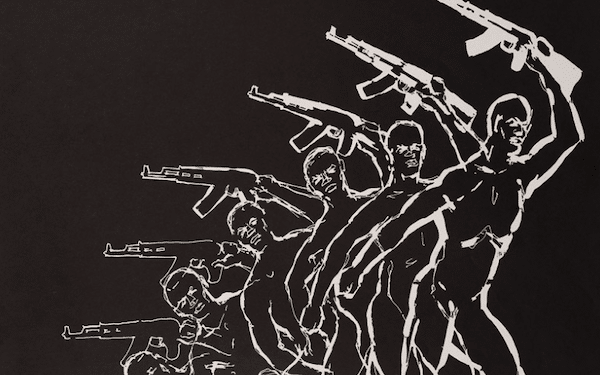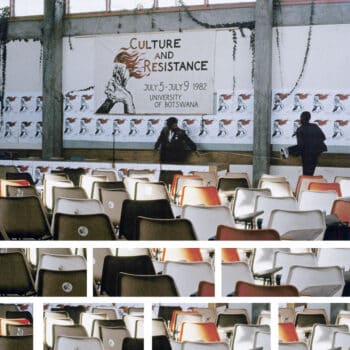Dear friends,
Greetings from the desk of Tricontinental: Institute for Social Research.
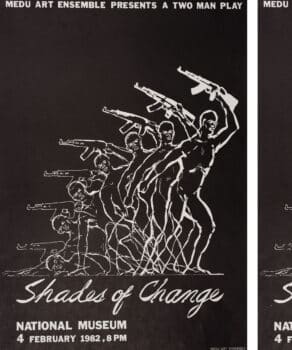
Medu Art Ensemble, Shades of Change, 1982. This two-man play, set in a prison cell, was written by Mongane Wally Serote. (Photo: Medu Art Ensemble via Freedom Park)
In the ancient time of national liberation, when partisans walked among the people in rural hamlets or small towns, they carried their message forward in the palms of their hands, their rifles slung over their shoulders, newspapers and pamphlets in their bags. Given the prevalence of illiteracy in the colonized world, partisans often gathered people around small fires and read these texts aloud (it is fitting that the Latin word for ‘fire’ is focus). This literature of national liberation shared theories of exploitation and oppression that made sense to the people and encouraged them to join the struggle in their own way.
The newspapers and pamphlets shared not only information, but also important analyses of the ongoing struggle, with original poems, plays, stories, and drawings woven throughout. Such imaginative works were published alongside texts of didactic instruction in periodicals like El Moudjahid (‘The Fighters’), the newspaper of the National Liberation Front of Algeria, Cờ Giải Phóng (‘Liberation Flag’), the newspaper of the National Liberation Front of Vietnam, and Al Hadaf (‘The Goal’), the magazine of the Popular Front for the Liberation of Palestine.
In Al Hadaf and in his novel Umm Sa’ad about a Palestinian woman who encourages her son to join the fedayeen(‘guerrillas’), Ghassan Kanafani (1936—1972) showed that there can be no head without a heart. There can be no conceptualisation of the revolutionary tomorrow without a leap of the imagination to make the journey. Culture is the space not only to transmit the message, but also to visualize the future.
Culture is a vital centre of struggle. It is where people see who they are, learn what they are capable of, and dare to imagine what they would like to build in this world. Art itself does not change the world, but without bringing imagination to life through art, we would resign ourselves to the present. Radical artists allude to reality, trying to raise the consciousness of people who might otherwise not have considered this or that aspect of their relationship with others. It is the role of art to focus the people’s attention and build their confidence to struggle against the misery inflicted upon the global majority. Building this focus and confidence paves the path for people’s organisations to carry this new consciousness forward and build a better world. The nineteenth century slogan of ‘art for art’s sake’ is a cry of despair against the actual purpose of art in our society: to breathe in the ugliness that surrounds us and breathe out the beauty that inspires us to change that dreadfulness.
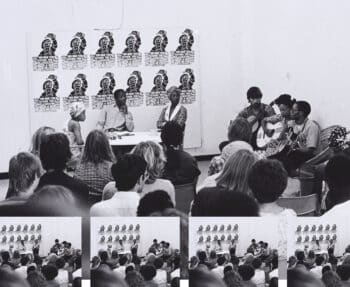
Medu members Lulu Emmig and Thami Mnyele (seated at the table in the front, from left to right) attend a Woman’s Day function at the Swedish Embassy in Gaborone, Botswana, 1981. (Photo: Sergio-Albio Gonzalez via Freedom Park)
The latest dossier from Tricontinental: Institute for Social Research, Culture as a Weapon of Struggle: The Medu Art Ensemble and Southern African Liberation, adopts this stance toward art and culture. Medu (which means ‘roots’ in Sesotho) was a collective built by artists involved in the southern African liberation struggles from 1979 to 1985. Among the sixty or so artists who belonged to the Medu collective were the influential poets Keorapetse William Kgositsile (South Africa’s first poet laureate) and Mongane Wally Serote (South Africa’s current poet laureate), writer Mandla Langa, musicians Jonas Gwangwa and Dennis Mpale, and visual artists Thamsanqa ‘Thami’ Mnyele and Judy Seidman. The dossier weaves together original interviews with many of the surviving artists and research that brings in the voices of those who did not survive the brutality of the apartheid regime. Based in Gaborone (Botswana), these artists came from a variety of political traditions, such as the Black Consciousness Movement, the African National Congress, and the South African Communist Party and were inspired by the broad tradition of national liberation movements from Vietnam to Chile. Together, the Medu collective built on Frantz Fanon’s idea that ‘it is at the heart of national consciousness that international consciousness establishes itself and thrives. And this dual emergence, in fact, is the unique focus of all culture’.
Medu, like other artists’ collectives rooted in national liberation, drew their inspiration from popular struggles, such as the fights to win control of the land, create an international anti-colonial project (the Pan-African movement), and build a national liberation project (as articulated in South Africa’s 1955 Freedom Charter). These were the resources that gave confidence to the artists in Medu as they painted and sang amongst the people who took part in the Durban strikes of 1973 and the Soweto Uprising of 1976.
From this energy and from their own practice, Medu produced a theory of art centred on three key principles: art is a necessary weapon of struggle; art must be produced in collectives that work in communion with the people; art must be made to be understood by the people. These three principles were articulated in their internal debates and in gatherings such as the Culture and Resistance Symposium and Festival of the Arts (held in July 1982 in Gaborone), which brought together hundreds to thousands of cultural workers from inside and outside South Africa to advance the cultural battle against South African apartheid. Together, Medu built up a distinct body of thought and theory of socialist art.
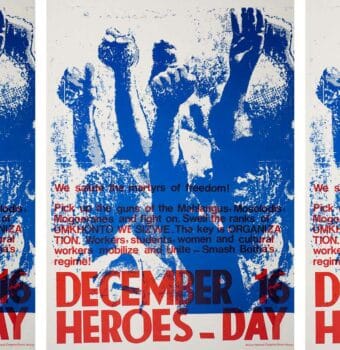
Medu Art Ensemble, December 16—Heroes Day, 1983. (Photo: Medu Art Ensemble via Freedom Park)
Then, on the night of 13 June 1985, a military detachment of the South African apartheid state crossed the border into Botswana and descended upon the homes of many exiled South African artists and activists. Two of the twelve people assassinated that night were Medu members, including the key visual and poster artist Thami Mnyele. The group’s ability to continue their work and advance their thinking was destroyed.
Apartheid regimes fear the inspirational power of the arts and the imagination. They respond with violence.
Thirty-eight years later, this war against art and culture continues, as we are witnessing in apartheid Israel’s genocidal rampage against Palestinians. Amongst the many painters and artists killed during this bombardment are the painter Heba Zagout (1984—2023), the muralist Mohammed Sami Qariqa (1999—2023), the poet and novelist Hiba Abu Nada (1991—2023), and the poet Refaat Alareer (1979—2023). Alareer’s poem ‘If I Must Die’, written in 2011, has resonated deeply with people across the world since he was assassinated by the Israeli Occupation Forces on 7 December.
If I must die
let it bring hope
let it be a tale.
The Israelis know the power of words. General Moshe Dayan once said that reading a poem by Fadwa Tuqan (1917—2003) was like ‘facing twenty enemy commandos’. In her poem ‘Martyrs of the Intifada’, Tuqan wrote of the Palestinian stone throwers. The poem itself is a stone thrown at Israel:
Organisers prepare for the first session of the Culture and Resistance Symposium and Festival of the Arts in Gaborone, Botswana, 1982. (Photo: Anna Erlandsson via Freedom Park)
They drew up the map of the road to life
they paved it with precious stones and with their young hearts
they raised their hearts as stones on their palms
embers and flame
and with these they pelted the monster of the road,
now is the time to show courage and strength,
their voice was heard strong everywhere
it reverberated everywhere
and there was courage and strength
they died standing
blazing on the road
shining like stars
their lips pressed to the lips of life.
Warmly,
Vijay

